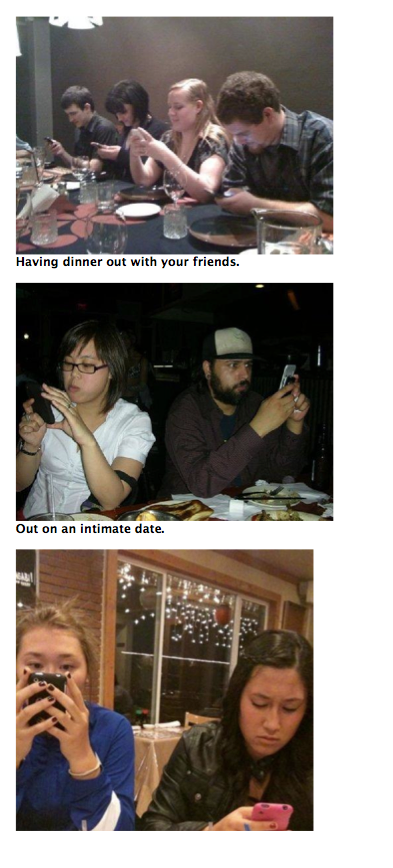Got an email from Mum today, another meme that I just couldn’t help debunking.
It starts with a series of pictures (see below), showing youngsters with their heads buried in smartphones, followed by a quote attributed to Einstein:
“I fear the day that our technology will surpass our human interaction. The world will have a generation of idiots.”
The near meaninglessness of the quote immediately raised my suspicion that it wasn’t a quote of his at all, so I spent 30 seconds googling and discovered I wasn’t the first one to question this attribution. This one neatly sums up the situation.
This is what I replied to Mum:
Einstein actually never said that, or in fact anything like it.
It is an “internet meme” concocted by people who hold the view along the lines “this is what we [or at least some of us] are, so this is all we can be”, and I think it’s rubbish.
fear, uncertainty and doubt – FUD – have followed on the coat tails of EVERY technological advance.
Fearmongers claimed that the gramophone would put an end to public performance of music; that movies & cinema would end live theatre; that TV would make our eyes square; that computers would make us dumber. and that’s just some of the relatively rational claims…
no.
live music is alive and well.
theatre lives on, aided in many ways by technology.
eyes continue to be round, and countless billions educated, informed, and entertained by it every hour of every day. no one claims now that all TV is bad because of what people choose to watch, any more than they claimed with any credibility that all books were bad because of what some people choose to read; remember, Mills and Boon was a product of YOUR generation! ;)
computers give us, among many things, the ability to type a few words into Google and find out if Einstein really did say those words, and discover in a matter of seconds that in fact he didn’t, and then pause to wonder at the mind(s) and intent/motivation behind those who claim that he did.
Einstein and his peers discovered and invented something that still threatens our survival as a species on this planet even now. but that’s not all that opening that door of inquiry did; many secrets of our physical world are still unfolding since crossing that threshold, and many tangible benefits have come from it that out-number the deleterious risk of its original application in just about every way you care to measure it; and we continue to have the option, if we are sufficiently motivated, to cease using that original application of nuclear technology.
each step of the way, our collective culture has to take each of these new technologies and experiment with them, learn what they’re good for and not-so-good for, and adapt it to human needs and wants.
having “the internet in your pocket” (or in your hands while seated at a cafe table with your closest friends) is so utterly new and novel and empowering that our culture hasn’t yet settled on new norms and etiquettes for dealing with the social ramifications of these new tools.
prior to 7 years ago when business executives or True Geeks pulled out an internet-connected smart-phone and tapped away at it while in the company of Normal People, they were looked upon with a bit of disdain, but it was mostly tolerated; “their interests are specialised” the ignorant folk conceded. back then smartphones were an insignificant blip on our collective radar.
then Apple showed us how to make proper smartphones and tablets, and everyone else (manufacturers) followed.
now everyone wants one and wants to use it in all sorts of ways and places and situations that were never possible or practical before.
some other people want society to jump to some imagined conclusion point, some “this is how and when and where smartphones should be used in public, BUT NO FURTHER!”.
well, they can keep wanting, because it will simply take time, not withstanding that there will never be one universal etiquette on the who/what/when/where/how of their use, any more than we can agree on a pan-cultural, universally acceptable use of, and behaviour within, a public toilet.
i’d like to think that Einstein would just shake his crazy-haired head at these pictures and accept that technology is a continuum, and say that people will sooner or later rediscover what’s most important, and re-define the limits of what is acceptable and not acceptable for the use of each technology for themselves, and leave others to do as they wish.
but then, Einstein probably never said anything of the sort ;)



